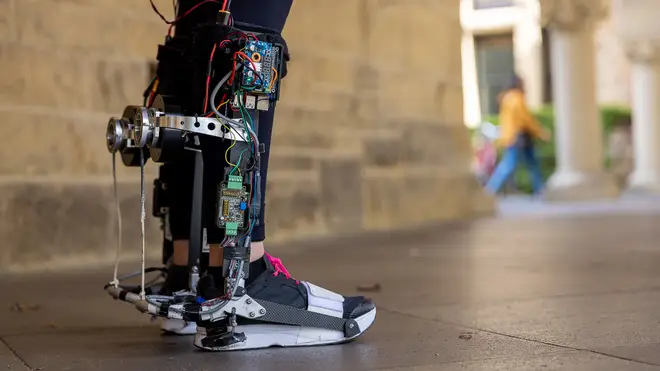
Matthew Wright 7am - 10am
12 October 2022, 19:24

The energy savings and speed boost from using the device were equivalent to ‘taking off a 30-pound backpack’, the researchers said.
An exoskeleton “boot” that allows people to walk 9% faster with 17% less effort has been developed by scientists.
This robotic footwear comes with a motor that works with calf muscles to give the wearer an extra push with every step, researchers from Stanford University in the US said.
The team said its work, which is published in the journal Nature, could help people with mobility impairments “move throughout the world as they like”.
Patrick Slade, who worked on the exoskeleton as a PhD student at the Stanford Biomechatronics Laboratory and is the first author on the study, told the PA news agency: “There are a number of clinical populations we hope to help including older adults, people with muscle weakness from a variety of conditions like stroke, and specific injury recoveries for things like Achilles tendon strain.
“We are starting to perform studies to explore the benefits of using our device with older adults.
“In general, older adults have muscle loss, walk more slowly, and require more effort to walk at the same speeds as younger people so we are excited about the possibility of helping reverse these trends.”
The engineers used machine-learning technology to develop their untethered exoskeleton boot – which can be personalised to suit the wearer’s needs.
Sensors were incorporated into the device to monitor movement.
Mr Slade said: “We measure force and ankle motion through the wearables to provide accurate assistance.
“By doing this, we can carefully control the device as people walk and assist them in a safe, unobtrusive way.”
Tests showed that using the device led to a 9% increase in walking speed with 17% less energy expended per distance travelled, compared to walking in normal shoes.
The energy savings and speed boost were equivalent to “taking off a 30-pound backpack”, the researchers said.
Steve Collins, an associate professor of mechanical engineering who leads the Stanford Biomechatronics Laboratory and one of the authors on the study, said: “We’ve been working towards this goal for about 20 years and I’m honestly a little stunned that we were finally able to do it.”

He added: “These are the largest improvements in the speed and energy of economy walking of any exoskeleton to date.
“In direct comparisons on a treadmill, our exoskeleton provides about twice the reduction in effort of previous devices.”
As part of the next steps, the researchers are planning to develop variations of the device that can be used to help improve balance and reduce joint pain.
They aim to work with commercial partners to turn the exoskeleton boot into a product.
Mr Slade said: “I believe that over the next decade we’ll see these ideas of personalising assistance and effective portable exoskeletons help many people overcome mobility challenges or maintain their ability to live active, independent and meaningful lives.”